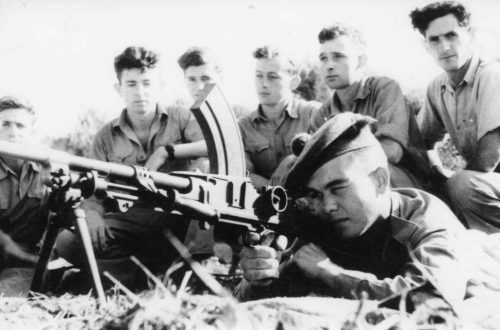The May 28, 1955, issue of The New Yorker magazine included a piece by the late great A.J. Liebling based on a visit to Glasgow.
At the time of his visit, the American evangelist Billy Graham was conducting one of his crusades in the city. On a Sunday evening on Drury Street, Liebling watched a street preacher address a small crowd. A little while later in the same location, the Clyde Socialist Group held a public meeting. At the time Britain’s national newspapers were shut down by a strike, and the theme of the meeting was “No Newspapers–No Lies.”
They had a professional-looking portable stand, like a metal stepladder with a shelf on top of it, for their speakers, and a couple of young men in sports jackets and slacks, and with their hair cut in duck tails, were moving about, bent double, to reletter some chalked “NO NEWSPAPERS—NO LIES” inscriptions, which had been scuffed about by the army of righteousness. They even had an audience: nine men, including me. The eight others wore caps.
The Group was coquettish about getting under way. Seven-thirty had long passed, but the young men still fussed with the chalk marks, hoping to attract more of the curious. Finally, with the audience apparently stable at seventeen, the first speaker opened the meeting. He was a little egg-shaped man with the pink, round face of an angry baby. When he began to speak, however, he made it plain that he believed in full-grown actions. “The Clyde Socialist Group-a believes-a in the forrcible overthrow-a of the goovermint-a,” he said. The “a” he appended to almost every polysyllable and to some monosyllables was evidently an oratorical device calculated to make his words more impressive. He had begun using it, I suppose, as a break to permit him to take breath, but it was now sheer ornament, and he loved it. “The Labour Party-a has betrayed the doctrine-a of Carol Marex-a, who never-a envisaged-a the overthrow of the goovermint-a by democratic-a processes,” he went on. The Glasgow accent is extremely varied, and I have no way of knowing if the fellow was a true Glaswegian or an émigré from some other part of North Britain. He didn’t talk at all like the cabdriver, and the cabdriver hadn’t talked like the man behind the bar. “Nothing could be farther-a from my thought than to take up your-a time-a when you are-a waiting impatiently to hear our comrade Hugh Savage on-a ‘No Newspapers—No Lies-a,’” the speaker continued. “But I feel-a impelled-a to say a few words-a about the Great-a Crusade-a of Mr. Billy Graham—the old copitalist-a soporific of-a Pay in the Skay. The Crusade is financed-a by copitalists who want the worrkers to forget their legitimate-a grievances here-a below-a. But it os collopsed-a! Among the hoondreds-a of convairts—larrgely the same ones-a who come forward every night—there os been not one lad from the shipyards! Not one worrkingmon!” We of the audience, our backs flattened against the shop window of Dunn & Co., hatters, received these remarks in dead silence. The young men mutely peddled copies of an innocuous four-page newspaper called Revolt.When the little man had shot his bolt against Pay in the Skay–forrcible rrevolution-a was his norrow poth to salvation—Comrade Savage mounted the stepladder. He grabbed the ends of the shelf as if they were the handle bars of a powerful motorbike on which he was taking off for immortality. Comrade Savage was a young man, short even in his elevator shoes, with a sullen, handsome Celtic face–high cheekbones, straight forehead, curly hair, and a profile that he appreciated. The capitalist press, he said, was a conspiracy against the worker to beguile him with stories of saix and distract his attainshun from the main eessues. The late Labour Government had, indeed, appointed a Commission of Enquiry into the press, but the chairman had been an Oxfurmon. How cou we expect conclusions of volue from an Oxfurmon? He spoke of Oxford in the tone ]oe McCarthy uses for Harvard. The workers had shown what they could do by payralyzing this monster (the strike was destined to end three days later, but he didn’t know that, of course), and sairtain sayctions of it might never recover. “The Noo Skronikel,” he shouted, referring to the London News Chronicle, “is reported to be on its laist laigs!” [In fact it folded five years later.] There was one national newspaper, he continued, that cou na be sayed to be copi’alist controlled—the Daily Worker—but that ha betrayed the Breetish workingmon by constituting i’self an instrument of Soviet foreign policy. He cited no specific instances of how the press had deceived the workingman; its chief crime, evidently, was that it “made the workingmon feel infeerior,” and here, I felt, the recollection of some childhood snub echoed in the conceited, dogmatic voice. The men in caps listened silently. “Wain vaisted interaists os becoom the foonction of the praiss, we’re be’er oaf wi’oot it!” he stormed, and subsided. There was a dead stillness. The men in caps dispersed. The boys with the duck-tail haircuts folded the stepladder. The meetings had presented two faces of old-fashioned intolerance, but the people on the street had paid hardly any attention to either.
The next evening Liebling attended one of Billy Graham’s crusade meetings at Kelvin Hall and observed:
As the angry man on Drury Street had said, there were no workingmen to be seen among the converts. In Glasgow, a workingman dresses differently from a clerk. These were all white-collar people.
Am I right in guessing this had less to do with Glasgow workingmen being more immune than others to Pay-in-the-Skay promises than it had to do with them being mostly Catholics, and therefore unlikely to attend the meeting of a Protestant evangelist?


